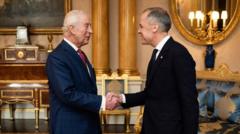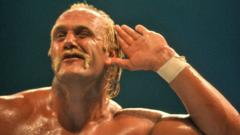The invitation marks a notable shift in Canada's royal engagement, conveying a strong message about national identity.
King Charles' Upcoming Visit: A Diplomatic Gesture Amidst Trump Tensions

King Charles' Upcoming Visit: A Diplomatic Gesture Amidst Trump Tensions
In a significant move, Prime Minister Mark Carney invites King Charles III to Canada, signaling diplomatic strength against U.S. President Trump’s provocations.
---
In an unexpected diplomatic twist, Canadian Prime Minister Mark Carney has extended an invitation to King Charles III to address the opening of Canada’s 45th parliament, showcasing an evolving relationship with the British monarchy amid fraught U.S.-Canada relations. Unlike past governments that oscillated between embracing and distancing from royal ties, Carney's invitation stands as a clear assertion of Canada's sovereignty, especially in light of U.S. President Donald Trump's controversial views suggesting Canada would be better off as a U.S. state.
Historically, Canada has navigated a complex journey away from colonial influences. The once-controversial presence of British monarchs in Canadian politics, such as the uproar following Stephen Harper's emphasis on monarchic ties, has undergone substantial transformation. With Prime Minister Justin Trudeau, the connection to the monarchy faded as he reversed Harper's decisions, signaling a more independent trajectory for Canada.
However, with Carney’s invitation to King Charles, a different narrative is emerging. Experts suggest that this gesture not only emphasizes Canadian traditions but also gains significance against Trump’s disregard for the nation’s sovereignty. Royal historian Justin Vovk posits this move as "a theatrical display" aimed at distinguishing Canada from its American neighbor, bolstering the nation’s unique cultural identity.
Carney's invitation is particularly notable since no British monarch has delivered Canada’s throne speech since 1977, marking this upcoming visit as both significant and rare. The idea is that this royal appearance will mend fences with Trump, who admires the British monarchy, and elevate Canada’s status on the world stage.
Though a sizable portion of the Canadian populace is indifferent or critical of the monarchy, especially in the wake of discussions around reconciliation with Indigenous peoples and the long-overdue colonial legacy, the spectacle of royal engagement continues to intrigue some citizens. Meanwhile, political factions in Quebec, such as the Bloc Québécois, continue to advocate for severing ties with the monarchy, underscoring ongoing debates about national identity.
As Carney prepares for a visit from the King and Queen, which comes after cancelled plans due to the King's health, the event is expected to symbolize a deeper connection with both the monarchy and Canada’s European allies. The palace has indicated that the upcoming throne speech aims to encapsulate a pivotal moment in the relationship between the Head of State and the Canadian populace, further establishing the monarchy’s role as a stable entity amidst a changing political landscape.
In an unexpected diplomatic twist, Canadian Prime Minister Mark Carney has extended an invitation to King Charles III to address the opening of Canada’s 45th parliament, showcasing an evolving relationship with the British monarchy amid fraught U.S.-Canada relations. Unlike past governments that oscillated between embracing and distancing from royal ties, Carney's invitation stands as a clear assertion of Canada's sovereignty, especially in light of U.S. President Donald Trump's controversial views suggesting Canada would be better off as a U.S. state.
Historically, Canada has navigated a complex journey away from colonial influences. The once-controversial presence of British monarchs in Canadian politics, such as the uproar following Stephen Harper's emphasis on monarchic ties, has undergone substantial transformation. With Prime Minister Justin Trudeau, the connection to the monarchy faded as he reversed Harper's decisions, signaling a more independent trajectory for Canada.
However, with Carney’s invitation to King Charles, a different narrative is emerging. Experts suggest that this gesture not only emphasizes Canadian traditions but also gains significance against Trump’s disregard for the nation’s sovereignty. Royal historian Justin Vovk posits this move as "a theatrical display" aimed at distinguishing Canada from its American neighbor, bolstering the nation’s unique cultural identity.
Carney's invitation is particularly notable since no British monarch has delivered Canada’s throne speech since 1977, marking this upcoming visit as both significant and rare. The idea is that this royal appearance will mend fences with Trump, who admires the British monarchy, and elevate Canada’s status on the world stage.
Though a sizable portion of the Canadian populace is indifferent or critical of the monarchy, especially in the wake of discussions around reconciliation with Indigenous peoples and the long-overdue colonial legacy, the spectacle of royal engagement continues to intrigue some citizens. Meanwhile, political factions in Quebec, such as the Bloc Québécois, continue to advocate for severing ties with the monarchy, underscoring ongoing debates about national identity.
As Carney prepares for a visit from the King and Queen, which comes after cancelled plans due to the King's health, the event is expected to symbolize a deeper connection with both the monarchy and Canada’s European allies. The palace has indicated that the upcoming throne speech aims to encapsulate a pivotal moment in the relationship between the Head of State and the Canadian populace, further establishing the monarchy’s role as a stable entity amidst a changing political landscape.


















